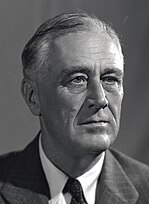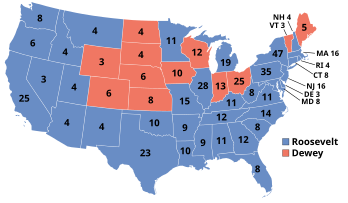U.S. presidential election, 1944
|
|
|||||||||||||||||||||||||||||
|---|---|---|---|---|---|---|---|---|---|---|---|---|---|---|---|---|---|---|---|---|---|---|---|---|---|---|---|---|---|
|
|||||||||||||||||||||||||||||
|
531 electoral votes of the Electoral College 266 electoral votes needed to win |
|||||||||||||||||||||||||||||
| Turnout | 55.9% |
||||||||||||||||||||||||||||
|
|||||||||||||||||||||||||||||
|
Presidential election results map. Blue denotes those won by Roosevelt/Truman, red denotes states won by Dewey/Bricker. Numbers indicate the number of electoral votes allotted to each state.
|
|||||||||||||||||||||||||||||
|
|||||||||||||||||||||||||||||
Franklin D. Roosevelt
Democratic
Franklin D. Roosevelt
Democratic
The United States presidential election of 1944 was the 40th quadrennial presidential election, held on Tuesday, November 7, 1944. Incumbent President Franklin D. Roosevelt, the Democratic nominee, sought his fourth term in office; he defeated Republican Thomas E. Dewey in the general election.
The election was set against the backdrop of World War II, which was going well for the United States and its Allies. Roosevelt had already served longer than any other president, but remained popular. Unlike in 1940, there was little doubt that he would run for another term as the Democratic candidate. Dewey, the Governor of New York, campaigned against the New Deal and for a smaller government, but was ultimately unsuccessful in convincing the country to change course. Rumors of Roosevelt's ill health, though somewhat dispelled by his vigorous campaigning, proved to be prescient; Roosevelt would die and be replaced by his new Vice President, Harry S. Truman, within a half-year of winning re-election.
Democratic candidates:
President Roosevelt was the popular, wartime incumbent and faced little formal opposition. Although many Southern Democrats mistrusted Roosevelt's racial policies, he brought enormous war activities to the region and the end of its marginal status was in sight. No major figure opposed Roosevelt publicly, and he was re-nominated easily when the Democratic Convention met in Chicago. Some pro-segregationist delegates tried to unite behind Virginia senator Harry F. Byrd, but he refused to campaign actively against Roosevelt, and did not get enough delegates to seriously threaten the President's chances.
...
Wikipedia




